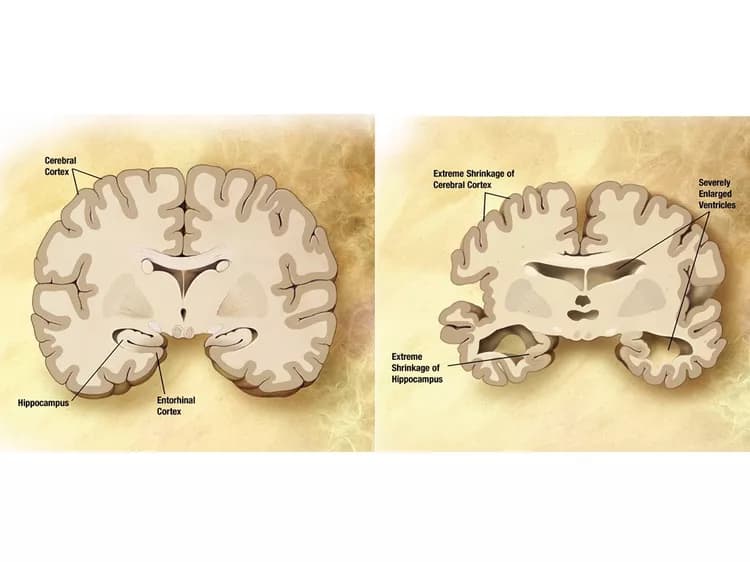While strokes are known to increase risk for dementia, much less is known about diseases of large and small blood vessels in the brain, separate from stroke, and how they relate to dementia. Diseased blood vessels in the brain itself, which commonly is found in elderly people, may contribute more significantly to Alzheimer's disease dementia than was previously believed, according to new study results published in June in The Lancet Neurology, a British medical journal.
"Cerebral vessel pathology might be an under-recognized risk factor for Alzheimer's disease dementia," the researchers wrote.
The study by researchers from the Rush Alzheimer's Disease Center analyzed medical and pathologic data on 1,143 older individuals who had donated their brains for research upon their deaths, including 478 (42 percent) with Alzheimer's disease dementia. Analyses of the brains showed that 445 (39 percent) of study participants had moderate to severe atherosclerosis -- plaques in the larger arteries at the base of the brain obstructing blood flow -- and 401 (35 percent) had brain arteriolosclerosis -- in which there is stiffening or hardening of the smaller artery walls.
The study found that the worse the brain vessel diseases, the higher the chance of having dementia, which is usually attributed to Alzheimer's disease. The increase was 20 to 30 percent for each level of worsening severity. The study also found that atherosclerosis and arteriolosclerosis are associated with lower levels of thinking abilities, including in memory and other thinking skills, and these associations were present in persons with and without dementia.
"Both large and small vessel diseases have effects on dementia and thinking abilities, independently of one another, and independently of the common causes of dementia such as Alzheimer's pathology and strokes," said Dr. Zoe Arvanitakis. A neurologist and researcher at the Rush Alzheimer's Disease Center, Arvanitakis led the study, which was funded by the National Institutes of Health.
Part of Rush University Medical Center, the Rush Alzheimer's Disease Center is dedicated to the study of Alzheimer's, a neurological condition that is the most common cause of dementia. It is one of 29 designated centers in the United States funded by the National Institute on Aging.
The study was not designed to determine causation of Alzheimer's dementia, or even whether vascular disease or Alzheimer's developed first. "But it does suggest that vessel disease plays a role in dementia," Arvanitakis said. "We found that blood vessel diseases are very common in the brain, and are associated with dementia that is typically attributed to Alzheimer's disease during life."
Does preventing cerebrovascular disease also prevent Alzheimer's?
The study examined which cognitive difficulties are caused by vessel diseases and whether vessel disease and Alzheimer's are more destructive in tandem than they would be alone. An editorial in The Lancet Neurology that accompanied the study findings noted that while other studies have indicated that proactive measures like eating a selective diet and getting regular exercise might protect people against getting Alzheimer's, those interventions might actually be acting on non-Alzheimer's disease processes, such as cerebrovascular disease.
Arvanitakis says they don't know yet. "They may decrease actual Alzheimer's, and possibly even work by yet other pathways," Arvanitakis said. "We hope to better distinguish how the clinical expression of vessel diseases in the brain differ from those of Alzheimer's, so that we may eventually use earlier and more targeted treatments for dementia."
Nearly 47 million people now live with dementia worldwide, according Alzheimer's Disease International, the international federation of Alzheimer associations around the world. By 2050, that number is projected to be 132 million. Therefore, finding ways to treat or prevent the disease "is a major goal," Arvanitakis said.
The participants in the study published in Lancet Neurology came from two (RADC) cohort studies, the Religious Orders Study and the Rush Memory and Aging Project, which have followed people older than 65, in their communities, for more than two decades. Participants receive annual health assessments and agree to donate their brains for research upon their deaths. The Lancet Neurology study used clinical data gathered from participants from 1994 to 2015, and pathologic data obtained from examination of the brains donated for autopsy, and used regression analyses to determine the odds of Alzheimer's dementia and levels of cognitive function, for increasing levels of brain vessel diseases.
The above post is reprinted from materials provided by Rush University Medical Center. Note: Materials may be edited for content and length.
Disclaimer: DoveMed is not responsible for the adapted accuracy of news releases posted to DoveMed by contributing universities and institutions.
Primary Resource:
Arvanitakis, Z., Capuano, A. W., Leurgans, S. E., Bennett, D. A., & Schneider, J. A. (2016). Relation of cerebral vessel disease to Alzheimer's disease dementia and cognitive function in elderly people: a cross-sectional study. The Lancet Neurology.
Related Articles
Test Your Knowledge
Asked by users
Related Centers
Related Specialties
Related Physicians
Related Procedures
Related Resources
Join DoveHubs
and connect with fellow professionals


0 Comments
Please log in to post a comment.